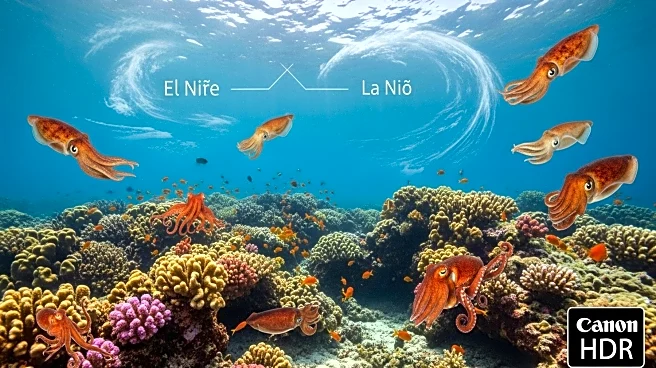What's Happening?
The National Oceanic and Atmospheric Administration (NOAA) has defined El Niño and La Niña events based on the Oceanic Niño Index (ONI), which measures sea surface temperature anomalies. An El Niño event occurs when the ONI remains above 0.5°C for five consecutive months, while a La Niña event is characterized by an ONI below -0.5°C for the same duration. Research has shown that the cephalopod species Sthenoteuthis oualaniensis, found in the northwestern Indian Ocean, exhibits greater adaptability to La Niña conditions. These conditions typically expand the range of suitable habitats for the species, compared to the contracted environment during El Niño events. This adaptability suggests that La Niña occurrences enhance the survival prospects of Sthenoteuthis oualaniensis.
Why It's Important?
Understanding the impact of El Niño and La Niña events on marine life is crucial for fisheries and environmental management. The adaptability of Sthenoteuthis oualaniensis to La Niña conditions could influence fishing strategies and conservation efforts in the northwestern Indian Ocean. As La Niña events expand suitable habitats, they may lead to increased catch volumes, benefiting the fishing industry. Conversely, El Niño events could pose challenges by reducing habitat availability, potentially affecting the economic stability of fisheries reliant on this species. These findings underscore the importance of monitoring climatic patterns to predict and mitigate their effects on marine ecosystems and related industries.
What's Next?
Future research may focus on developing predictive models to anticipate changes in cephalopod habitats based on climatic events. Such models could assist in optimizing fishing efforts and ensuring sustainable practices. Additionally, policymakers might consider integrating these findings into broader environmental strategies to address the impacts of climate variability on marine biodiversity. Collaboration between scientific communities and fisheries could enhance adaptive management approaches, ensuring resilience against climatic fluctuations.
Beyond the Headlines
The study of Sthenoteuthis oualaniensis in relation to ENSO events highlights broader ecological implications. The adaptability of marine species to climatic changes can serve as indicators of ecosystem health and resilience. This research may prompt further investigations into the effects of climate variability on other marine organisms, potentially revealing interconnected dynamics within oceanic ecosystems. Ethical considerations regarding the exploitation of marine resources during favorable climatic conditions may also arise, necessitating balanced approaches to conservation and industry interests.









